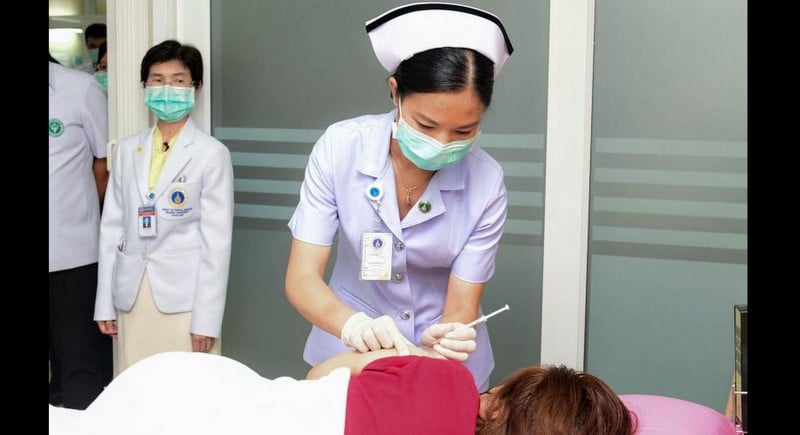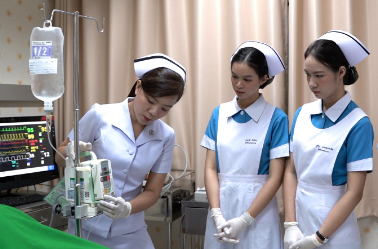
Thailand Nursing School
The State of Nursing Schools in Thailand: Ranking, Comparison, and Unique Qualities
Thailand’s nursing education system has seen remarkable growth over the past few decades, with several nursing schools in the country now recognized among the best in Asia. These institutions have developed curricula that blend traditional Thai values of care and hospitality with cutting-edge research and clinical training, making them unique in the field of nursing education. This blog explores how Thailand’s nursing schools rank, how they compare to Western nursing colleges, and the distinct features that set them apart.
Top Nursing Schools in Thailand
Thailand boasts numerous well-established nursing programs, with several schools ranking high in Asia and gaining international recognition. The top nursing schools include:
1. Mahidol University Faculty of Nursing
• Rank: Consistently ranked as the #1 nursing school in Thailand and among the top 100 globally.
• Programs: Offers undergraduate, master’s, and doctoral degrees with a strong focus on research and clinical practice.
• Accreditation: Accredited by the Thailand Nursing and Midwifery Council and recognized for producing high-caliber graduates who are sought after both locally and internationally.
2. Chiang Mai University Faculty of Nursing
• Rank: One of the leading nursing schools in Southeast Asia.
• Specialties: Known for its focus on community health, nursing administration, and gerontological nursing.
• International Collaborations: Partners with numerous international institutions for student exchange programs and collaborative research.
3. Chulalongkorn University Faculty of Nursing
• Rank: Often ranked within the top 3 nursing schools in Thailand.
• Strengths: Focuses on leadership in nursing, clinical excellence, and innovative research.
• Global Recognition: Many faculty members are involved in global health research, and the school has partnerships with nursing schools in the U.S., Canada, and Australia.
4. Thammasat University Faculty of Nursing
• Known for its emphasis on holistic care and interdisciplinary studies, integrating health sciences with social sciences to address complex healthcare issues.
How Thai Nursing Schools Compare to Western Colleges
While nursing education in Thailand is still evolving compared to countries like the U.S., Canada, and the U.K., Thai nursing schools are rapidly closing the gap. Here’s how they measure up:
1. Curriculum and Clinical Training
• Thai nursing schools follow the standards set by the Thailand Nursing and Midwifery Council, ensuring rigorous academic and clinical training comparable to Western institutions.
• They offer strong clinical training programs with extensive fieldwork, often in rural and community settings, which provides hands-on experience that is sometimes limited in urban-centric Western colleges.
2. Cultural Competency and Holistic Approach
• Thai nursing programs emphasize cultural competency, teaching nurses to provide care that respects cultural traditions and individual preferences—an area where Western schools may not place as much emphasis.
• Holistic care is a cornerstone of Thai nursing education, with programs integrating traditional Thai medicine and holistic therapies alongside Western medical practices.
3. Global Recognition and Accreditation
• Some Thai nursing schools have received international accreditation or partnerships with Western universities, allowing graduates to work abroad or pursue further studies in other countries with greater ease.
4. Research and Innovation
• While Western nursing colleges often lead in research, Thai nursing schools like Mahidol University have made significant strides in contributing to global health research, particularly in areas such as infectious disease control and community health.
Unique Aspects of Thai Nursing Schools
What makes Thai nursing schools stand out from their Western counterparts are the unique features and approaches they offer:
1. Focus on Community Health
• Thai nursing programs place a heavy emphasis on community health nursing, preparing students to work not only in hospitals but also in rural and underserved areas. This contrasts with the more hospital-centric training often seen in Western schools.
2. Integration of Traditional Thai Medicine
• Some nursing schools in Thailand include courses on traditional Thai medicine, such as herbal treatments, massage therapy, and mindfulness practices. This integration equips nurses to offer holistic care that incorporates both modern and traditional healing methods.
3. International Collaborations and Student Exchange Programs
• Many Thai nursing schools have developed strong international collaborations, providing students with opportunities for global exposure through student exchange programs and international conferences.
Statistics and Global Impact
• As of recent data, Thailand has over 80,000 registered nurses, many of whom have been trained in these top institutions.
• The ratio of nurses to patients in Thailand is 1:500, better than many countries in the region, showcasing the effectiveness of the country’s nursing education system.
• A 2023 survey showed that 90% of Thai nursing graduates find employment within three months of graduation, with many securing positions in international hospitals.
Conclusion
Thailand’s nursing schools are rapidly becoming a competitive force in global nursing education. With a strong focus on community health, cultural competence, and international collaborations, they offer unique educational experiences that prepare nurses to meet diverse healthcare needs both locally and internationally. While there are areas for growth, such as research infrastructure and global accreditation, Thai nursing schools are setting a high standard for nursing education in Asia and beyond.
Exploring Boromarajonani College of Nursing Chiang Mai

A nurturing enviroment of Nursing Education
Boromarajonani College of Nursing Chiang Mai, located in the picturesque northern region of Thailand, is a prominent institution dedicated to nursing education. Established under the auspices of the Ministry of Public Health, this college plays a crucial role in training skilled nursing professionals who are equipped to meet the healthcare demands of the region and beyond.
Academic Excellence and Rankings
Boromarajonani College of Nursing Chiang Mai is highly regarded for its commitment to academic excellence and innovative nursing practices. While specific rankings for nursing colleges can vary year by year and may not always be publicly available, the college consistently receives positive recognition for its rigorous curriculum and strong focus on practical experience. It is often noted for its contributions to nursing research and community health initiatives, positioning it as a leader in nursing education within Thailand.
The college's programs are designed to ensure that graduates are not only knowledgeable but also adept at applying their skills in real-world settings. This emphasis on practical training has garnered respect from healthcare employers, making graduates highly sought after in the job market.
Tuition and Financial Considerations
Understanding the financial aspects of education is crucial for prospective students. The tuition fees at Boromarajonani College of Nursing Chiang Mai are relatively affordable compared to many international institutions. Typically, annual tuition costs range from THB 30,000 to THB 40,000 (approximately USD 900 to USD 1,200), depending on the specific program chosen.
In addition to tuition, students should consider other expenses such as textbooks, uniforms, and materials required for clinical practice. However, the college also provides various scholarship opportunities to support deserving students, helping to alleviate some of the financial burdens.
Programs Offered
The college offers a range of nursing programs, including:
Bachelor of Science in Nursing (BSN): This is the flagship program, designed to provide a comprehensive education in nursing theory, clinical skills, and patient care.
Master's Programs: For those looking to further their education, the college offers advanced degrees focusing on specialized areas of nursing practice.
Continuing Education: Boromarajonani College also provides opportunities for ongoing education and professional development for practicing nurses.
Community Engagement and Research
One of the defining features of Boromarajonani College of Nursing Chiang Mai is its commitment to community health. Students are encouraged to participate in outreach programs that serve local populations, providing essential healthcare services and education. This hands-on experience not only enhances students' learning but also strengthens the college's ties to the community.
Research is another cornerstone of the college's mission. Faculty and students engage in various research projects aimed at improving health outcomes and advancing nursing practices, contributing valuable knowledge to the field.
Conclusion
Boromarajonani College of Nursing Chiang Mai stands out as a leading institution for nursing education in Thailand. With its strong academic programs, commitment to community service, and affordable tuition, it continues to attract students who aspire to make a difference in the healthcare sector. For those considering a career in nursing, this college offers a nurturing environment where they can grow both personally and professionally, preparing them to tackle the challenges of modern healthcare.
